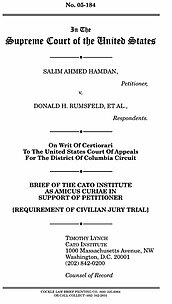Learn more about Cato’s Amicus Briefs Program.
Salim Hamdan is a prisoner at the U.S. Naval base in Guantanamo Bay, Cuba. He was initially taken into custody by the U.S. military in Afghanistan and then flown to the naval base in June 2002. According to government officials, Hamdan was involved with the Al Qaeda terrorist network, but Hamdan denies that allegation. One year later, in July 2003, President Bush declared his intention to put Hamdan on trial before a military tribunal. Hamdan was then moved from the general inmate population to solitary confinement. The military lawyer that was assigned to defend Hamdan promptly challanged the legality of the military tribunal and that legal challenge reached the Supreme Court for a resolution. President Bush argues that he has the “inherent power” to set up a special military court and try any person that he believes to be involved in terrorism. In this friend-of-the-court brief, Timothy Lynch argues that if the president chooses to try a person for a war crime, an offense that typically carries a death sentence, he cannot deny the accused the benefit to trial by jury. The brief serves as a reminder that the U.S. Constitution is the supreme law of the land, both in times of peace and war.

This work is licensed under a Creative Commons Attribution-NonCommercial-ShareAlike 4.0 International License.

